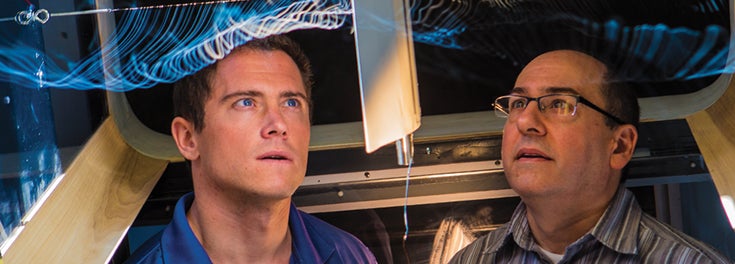
If you’re looking for an engineering internship fetching coffee, you need not apply here. Engineering students at the University of Rhode Island routinely land paid internships working on the next big thing in industries ranging from pharmaceuticals to insurance to construction to electronics. And those internships routinely result in paid jobs after (and sometimes before) graduation.
For mechanical engineering student Kim Verderber, an internship at insurer FM Global meant learning to put a price tag on hulking buildings like football stadiums. The Garden City, N.Y., resident also found herself rubbing shoulders at lunch with the CEO of the 5,300-employee company.
“It was hard to believe he’s the guy in charge of everything because he was so laid back and so interesting,” Kim says. “I wasn’t expecting to end up at an insurance company, but it was interesting and it opened a lot of doors.”
With private industry supporting URI engineering students both on and off campus, it’s little wonder that our engineering students find jobs. For the Class of 2013, a full 90 percent are employed in engineering or furthering their education one year after graduation.
For the 80 percent of engineering students who hold at least one internship before graduation, it’s a chance to see the professional world up-close while gaining valuable experience (and networks) for a resume. For the roughly 350 companies that hosted URI interns during the past four years, it’s an opportunity to bring a fresh perspective to challenges while building a pipeline of future employees.
“Close collaboration with URI faculty and students helps us profit in a number of ways, such as access to current research and coordination on areas of interest to us,” says David Kring, the chief scientist at naval architectural firm Navatek that hosts paid interns year-round. When the world leader in wind turbine technology and ship design chose its first East Coast location, proximity to URI was a major factor. Today, our engineering graduates make up half the staff, and many current students are interning there.
Around the corner from Kring’s office, intern and URI mechanical engineering student Shane Fairbrother of West Kingston codes software that optimizes the design of hydrofoils on ships. “It’s a unique problem,” Shane says. “It’s fun wrapping your mind around it.”
Navatek’s support also extends to sponsoring the University’s autonomous underwater vehicle team and, like many companies, working with students on engineering capstone design projects.
The company is not alone in supporting engineering students. Last school year, 88 companies provided gifts to the College of Engineering to strengthen education programs, purchase equipment and fund scholarships. Each year about 150 engineering students receive scholarships, many made possible through corporate generosity.
Corporations are also taking a lead to ensure students learn in facilities that match the high caliber of the URI engineering curriculum. In September, executives from across the state gathered at Toray Plastics (America) in North Kingstown to support a $125 million bond to construct a new engineering facility. Toray pledged $2 million toward the building should voters approve the question in November. The Taco White Family Foundation followed with a $300,000 pledge.
With private industry supporting URI engineering students both on and off campus, it’s little wonder that our engineering students find jobs. For the Class of 2013, a full 90 percent are employed in engineering or furthering their education one year after graduation.
So, if you’re an aspiring engineer, know that at URI, you have a robust pool of corporate support and a far better than average shot at a great job after graduation.
Pictured: Navatek Senior Engineer and URI ocean engineering graduate Christopher O’Reilly working in the Navatek wind tunnel with Lead Scientist Neil Fine.
